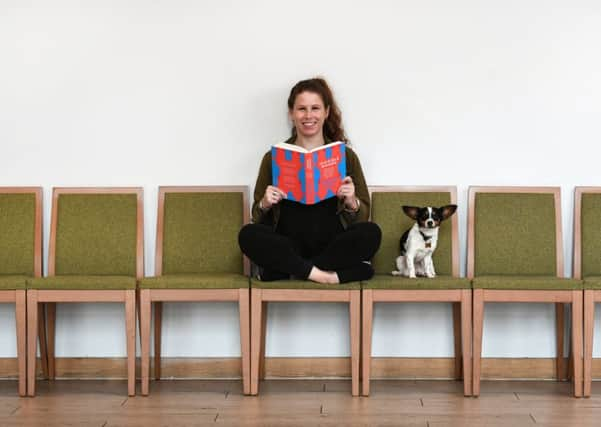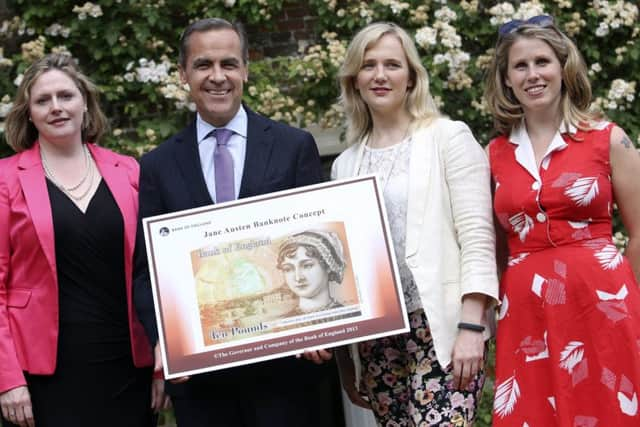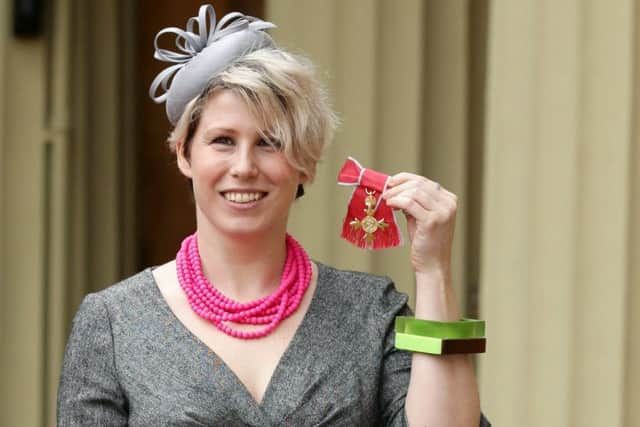Caroline Criado Perez tells Edinburgh why time’s up for a world designed for men


A woman and her dog stand outside Glasgow Royal Concert Hall. Young, wearing black jeans, khaki jacket and trainers, hair scraped up in a high pony-tail, quietly checking her mobile while the small dog waits patiently, paws planted four-square. She’s a young Everywoman, could be anyone, and I race past her to meet campaigner and feminist Caroline Criado Perez who is in town speaking at the First Minister’s National Advisory Council on Women and Girls Circle session and meeting the First Minister.
It’s no surprise Sturgeon has time for the feminist, social justice and political campaigner as part of the Scottish Government’s commitment to reduce gender inequality as Criado Perez is someone everyone wants to listen to right now.
Advertisement
Hide Ad

Of course when I meet Criado Perez five minutes later, she turns out to be the woman I’d rushed past outside and as soon as she opens her mouth, I can see why people take notice when she speaks. Articulate, fast-talking, irreverent and funny, she’s engaging and persuasive, full of what she’s in Glasgow to discuss, rings and bracelets flashing as she gesticulates and laughs.
“I’m talking about the gender data gap and how it affects policy, how historically we have designed everything from health to travel infrastructure to the economy around this mythical Reference Man, as if the average male is the average human. And as a result we haven’t bothered collecting data on women in order to design things for both women and men.”
As well as being a force on social media, the 35-year-old Liberty Human Rights Campaigner of the Year Award winner 2013 and OBE is the woman that got the Bank of England to put a woman back on their notes in the form of Jane Austen in 2017 and who started the campaign to get the first statue of a woman erected in Parliament Square last year. Suffragette Millicent Fawcett now stands alongside Churchill, Ghandi and Mandela. She also set up the Women’s Room website to challenge gender imbalance in the media and wrote her first book, 2016’s Do It Like A Woman, highlighting pioneering women.
Now she’s on a mission to fix the gender data gap and her latest book, Invisible Women has got everyone talking, feminist or not, about the missing information on women and its often lethal effects. Her Edinburgh International Book Festival event is already sold out.


You’ve probably heard the line about crash test dummies being based on men, so if you’re a woman you’re 47 per cent more likely to be seriously injured in a crash, discovered that women’s heart attack symptoms are completely different to men’s, or even wondered why mobile phones or house bricks are too big for women’s hands to hold.
Advertisement
Hide AdCriado Perez hones in on data to skewer the hidden systematic discrimination women face every day, with new research and stories highlighting the blanks in information that created unseen, often unintentional bias against women everywhere from public policy to technology, business and the media. Why, she asks, do we rely on data from studies done on men, usually Caucasian men aged 25 to 30 who weigh 70kg, or what Criado Perez calls ‘Reference Man’, who are used to represent humanity as a whole?
The beauty of Criado Perez’s approach is that it focuses on data, numbers and facts that affect us all, sidestepping abstruse debates about the nature of modern feminism.
Advertisement
Hide Ad“I thought this was a really good way of explaining feminism to people who didn’t previously understand it,” she says. “Especially if you’re a man, to understand what women are saying about how we feel when we are navigating a world that is hostile to us, when we’re catcalled, spoken over, patronised, groped, harassed. It’s hard to put yourself in that position if you haven’t been living in that culture, haven’t had your personality and the way you move around the world and what you think you can and can’t do shaped by that. They can try and empathise, and a lot of fantastic men do, but they haven’t experienced it. But they can understand things like if a woman is in a car crash she’s 17 per cent more likely to die.”
Invisible Women can be a sobering read, especially for women, but for the endlessly upbeat Criado Perez, the realisation of how bad things are is a catalyst for change, and hope.
“That is the positivity, that people are noticing it, that was why I wrote the book,” she says.
She goes on to explain her route into feminism, around the age of 25, when she read a book called Feminism and Linguistic Theory that pointed out that every time we use ‘he’ to mean he or she, or ‘man’ to mean humankind, women picture a man.
“I realised I was picturing men all the time when I was picturing just a random person and I thought how have I never noticed this? It was incredibly shocking and that realisation completely changed my life.
“I wrote the book to make people have that same realisation and show them how it permeates every aspect of our lives and affects policy in a really dangerous way. So for me, having so many people saying ‘oh my god, I’ve never noticed this and now I see it everywhere’, that is a huge source of hope. It’s the first step for people to recognise this is happening.
Advertisement
Hide Ad“And the second bit of hope is that there already are people in all sorts of arenas trying to address the data gap, in economics, medicine, design, post-disaster relief and by bringing their work to a wider audience they get the backing to make a difference.”
So far so lofty, but Criado Perez’s Twitter feed has been abuzz with a more fundamental topic of late: toilets, or rather the lack of them for women. Pictures of long frustrated queues for the ladies while men saunter into underused gents are posted on a daily basis.
Advertisement
Hide AdShe laughs. “I did joke that I’d become head of the toilet division of feminism the other day but it’s really great to see women saying ‘I’ve had enough of this bullshit’’. It’s not like we didn’t know about the queues, we just accepted it, like we accept everything and now women are realising, hang on, this is literally because they haven’t put in enough for us, this is a structural issue and it’s discrimination.”
“It sounds like a trivial issue,” she says, “but it isn’t for women who are pregnant, who have a urinary tract infection, for women on their period, women with children... there are so many reasons women need to access toilets urgently that it has a massive impact on their ability to access public space. And it’s just deeply, deeply unjust!” she says, and laughs.
Criado Perez is warming to her theme, and just because she’s upbeat and focuses on hope and progress, doesn’t mean she’s always immune to good old-fashioned feminist fury.
“Writing the book was an exercise in disbelief and rage,” she says, “as I discovered each new absolutely outrageous thing and each new attempt to dismiss it and excuse it. People saying oh well this doesn’t matter, women are too complicated to measure, oh it costs too much, or sex differences don’t really make any difference, all these things which are demonstrably untrue. Now more people are pushing back and saying, no, look at the evidence, this is absolute rubbish. The situation is bad, women are dying, and women are dying in substantial numbers, but there’s hope because people now know this is a problem.”
Criado Perez, who was born in Brazil was raised in various countries. Her father had a senior job with supermarkets, while her mother worked for Medecins Sans Frontieres and she was sent to boarding school in England at 11. It was there she began to notice gender differences for the first time.
“I remember sitting at lunch at school and realising I was the only girl talking and the boys didn’t like it. I thought I’d better try and shut up. There was all that unspoken stuff, knowing the boys were the ones with power and you couldn’t do what they didn’t like, instead of questioning, ‘hang on a minute, why should I have to shut up, this is complete bullshit?’
Advertisement
Hide Ad“I never did really manage to shut up,” she says, unnecessarily. “I did try. But I’m naturally quite a talkative person, and opinionated, always have been. That might come from growing up in a half-Argentine family full of men, with two older brothers. For whatever reason, I’m not the traditional quiet girl/woman and never have been.
“I took the approach, like a lot of girls in the ‘90s when feminism was a very dirty word, to think I’m different. Where the guys tell you you’re not like other girls, you’re not an emotional, crazy, hysterical bitch, and it’s the biggest compliment… But then you realise that’s just trashing all women, and I am a woman and I don’t know any women like that. I don’t think teenage girls nowadays fall for it,” she says.
Advertisement
Hide AdLike any woman sticking her head above the parapet Criado Perez gets more than her fair share of trolling and abuse. When she started the bank note campaign, she got so much that Twitter changed its policy on dealing with it and Criado Perez is still a target.
“It comes and goes. I’ve never had anything as bad as that again, in terms of this relentless stream of really graphic rape and death threats. I get abuse on a daily basis, and that is really difficult but I just believe too strongly in what I’m doing to allow it to shut me up.
“It comes from a place of fear at women challenging the system and is a threat to people who benefit from that system and obviously they are going to react in that way. So our generation and the generation that comes after is going to have to go through it, but at a certain point it’s just going to become normal that this is what women do and at that point it won’t be so frightening.”
For Criado Perez the advantages of social media and its ability to bring together the like-minded to back a campaign far outweigh the disadvantages.
“I wouldn’t have been able to do my campaigns without social media. What would I have done? Some random woman telling the Bank of England off about a bank note. They would have told me to sod off.”
So what’s next for Criado Perez? “I’m going to CLOSE the gender data gap in every country in the world!” she exclaims, then laughs at herself.
Advertisement
Hide AdOne thing she won’t be rushing to do is deliberately start any more campaigns, stressing that to date they happened organically as a result of her frustration.
“They’ve always been in the moment. I’ve got so pissed off I’ve just had to do something!”
Advertisement
Hide AdFor example noticing there were no statues of women while jogging through Parliament Square then researching that only 2.7 per cent of the statues in the UK were of women (excluding royals).
“You don’t start a campaign because it’s a considered decision, where you sit down and think ‘do I really want to do this?’. Because if you did, you would not do it. It’s not fun. They’re exhausting, take over your life and you get a lot of abuse. Of course it’s great when you win, but then you also get more abuse. So if I do another campaign it’s because something makes me so pissed off I can’t help myself. But at the moment I feel like I’ve got a big job with trying to address the gender data gap.”
Today Criado Perez, who has Scottish grandparents on her mother’s side, is particularly pleased that the Scottish Parliament has set up a working group on collecting data on sex and gender.
“I can’t tell you how DELIGHTED I am and overwhelmed this is happening, because that is all I want – for people to collect sex disaggregated data. It’s such a simple thing and governments just need to do it. Scotland seems more interested than Westminster. I can’t see Westminster setting up a working group on sex and gender. We’ve got the Fawcett Society, who are great, but they’re not an official thing that the Prime Minister goes to every… how often is this?” she asks.
Three times a year.
“Three times a year, f*** me! We don’t have that.”
There’s something very irreverent and approachable about Criado Perez, a quality that makes her message more inclusive. She’s particularly happy about messages from women saying their male partner has understood feminism for the first time after reading the book. Also, she understands entirely why some women might say ‘I’m not a feminist’.
“I used to say that as well. I think it’s about needing that lightbulb moment where you recognise this is a systemic issue. That by saying ‘I’m not a feminist’ you will somehow manage to escape it, that they will treat you differently, you will be able to escape the patriarchy if you just pretend it doesn’t exist. But it does. People need to have their lightbulb moment and for different people it will be different things.”
Advertisement
Hide AdAnd her advice for when a woman tells you they’re not a feminist?
“Tell them to shut up and go and read my book!” she guffaws loudly and Poppy’s ears twitch.
She’s joking.
Advertisement
Hide Ad“That’s a big ask, so maybe get them to listen to an hour’s podcast. They might just change their mind.”
Here’s hoping.
Invisible Women: Exposing Data Bias In a World Designed For Men is published by Chatto & Windus, £16.99
Caroline Criado Perez with Sally Magnusson, Time’s up on Ignorance is at the Edinburgh International Book Festival, tomorrow, 3:15-4:15pm, £12, £10; www.edbookfest.co.uk